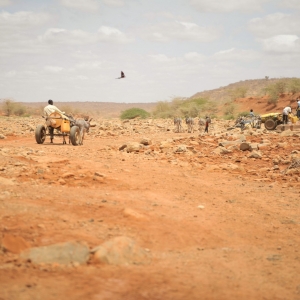Federal Water Tap, June 29: Supreme Court Will Not Hear Klamath Takings Case
The Rundown
Supreme Court action affirms Klamath Tribes’ senior water rights. The GAO analyzes federal flood buyouts. Senators attach water-related amendments to an annual Defense Department spending authorization bill. Energy regulators begin an environmental review of a California pumped storage hydropower project. A Colorado representative calls for peaceful negotiations among Nile basin countries over a new hydropower dam. And lastly, NOAA unveils updated tools for tracking and forecasting the annual Lake Erie algal bloom.
“In recent months, tensions have escalated between Ethiopia and Egypt, putting the project in jeopardy. We must honor our nation’s role as an observer of these negotiations and avoid taking on an additional role as a facilitator or mediator. Moreover, we must not play favorites or take any other action that may risk damaging the integrity of this process or put a peaceful, mutually beneficial agreement out of reach.” — Rep. Jason Crow (D-CO) calling for peaceful negotiations between Egypt, Sudan, and Ethiopia over the Grand Ethiopian Renaissance Dam, which will soon be completed. Located in Ethiopia on the Blue Nile, the dam is a source of tension in the basin. Downstream countries like Egypt and Sudan fear losing control over an essential water source, while Ethiopia is hungry for electricity to power economic growth. The countries say they will finalize a deal within two to three weeks.
By the Numbers
$20.5 billion: Debt the National Flood Insurance Program owes to the U.S. Treasury, as of March 2020. The debt has grown since the hurricane season of 2005. (Government Accountability Office)
News Briefs
Supreme Court Won’t Hear Klamath Takings Case
The Klamath Tribes earned a victory as the U.S. Supreme Court decided not to hear a challenge to their senior water rights to the Klamath River.
Farmers in the Klamath basin of Oregon brought the suit against the federal government, claiming that they were owed $30 million in compensation when irrigation water was restricted during a drought in 2001.
By not taking up the case, the Supreme Court is letting stand a lower court ruling that the Klamath Tribes’ have priority in the basin.
Military Spending Bill Amendments
Senators proposed several water-related amendments to the annual National Defense Authorization Act.
- Sens. Edward Markey (D-MA) and Bernie Sanders (I-VT) filed an amendment that would reduce the Defense Department’s budget by 10 percent, or $74 billion. The money would then be used for renewable energy, water systems, housing, healthcare centers, and other public works.
- Sens. Michael Bennet (D-CO) and Cory Gardner (R-CO) filed an amendment that would provide $10 million to reimburse water utilities for the cost of treating drinking water contaminated by Air Force activities with the chemicals PFOS and PFOA.
- Sen. Kamala Harris (D-CA) filed an amendment that would require an independent study of how water pollution in the Tijuana River affects Defense Department operations.
- Sen. Martha McSally (R-AZ) introduced an omnibus amendment involving water projects under the Bureau of Reclamation. That includes aquifer recharge, an aging infrastructure fund, dam safety funding, and rural water project feasibility studies.
Studies and Reports
Flood Mitigation Buyouts
Between 1989 and 2018, property acquisitions have accounted for about three-quarters of FEMA’s flood mitigation spending, according to a Government Accountability Office analysis. Spending in that period amounted to $5.4 billion.
Once acquired, the buildings are demolished and the land is left as green space. More than 46,000 properties were bought out for demolition.
Still, costs of the federal flood insurance program continue to rise, as the number of properties that have been flooded multiple times has grown.
The flood insurance program “represents a fiscal exposure to the federal government because its premium rates have not kept pace with the flood risk of the properties it insures,” the report concludes.
In context: Two Hurricanes, Two Floods: North Carolina Town Fights to Stay Alive
California Pumped Storage Hydro Project
Federal energy regulators are beginning to prepare an environmental impact statement for a 500-megawatt pumped storage hydropower project in California.
Nevada Hydro proposes to build a 200-foot-tall dam across Decker Canyon, in Cleveland National Forest. The project would be constructed above Lake Elsinore, in Riverside and San Diego counties.
Pumped storage uses twinned reservoirs as a form of battery. Water from the upper reservoir is released during peak energy demand. When demand is lower and electricity is cheaper, water from the lower reservoir is pumped uphill.
Comments on the scope of the review are due by August 17. Submit them via http://www.ferc.gov/docs-filing/efiling.asp, referencing project number P-14227-003.
On the Radar
Upgraded Lake Erie Algal Bloom Tools
NOAA unveiled new tools for forecasting the location and impacts of the annual Lake Erie algal bloom.
The tools include satellite observations of the bloom’s surface coverage and animated forecasts of its movement. They also include five-day forecasts of the bloom’s depth within the water for more than a dozen locations.
NOAA and its academic partners forecast that the bloom this summer will be smaller than last year, ranking between a 3 and 5 on a 10-point severity scale.
Federal Water Tap is a weekly digest spotting trends in U.S. government water policy. To get more water news, follow Circle of Blue on Twitter and sign up for our newsletter.
Brett writes about agriculture, energy, infrastructure, and the politics and economics of water in the United States. He also writes the Federal Water Tap, Circle of Blue’s weekly digest of U.S. government water news. He is the winner of two Society of Environmental Journalists reporting awards, one of the top honors in American environmental journalism: first place for explanatory reporting for a series on septic system pollution in the United States(2016) and third place for beat reporting in a small market (2014). He received the Sierra Club’s Distinguished Service Award in 2018. Brett lives in Seattle, where he hikes the mountains and bakes pies. Contact Brett Walton






Leave a Reply
Want to join the discussion?Feel free to contribute!